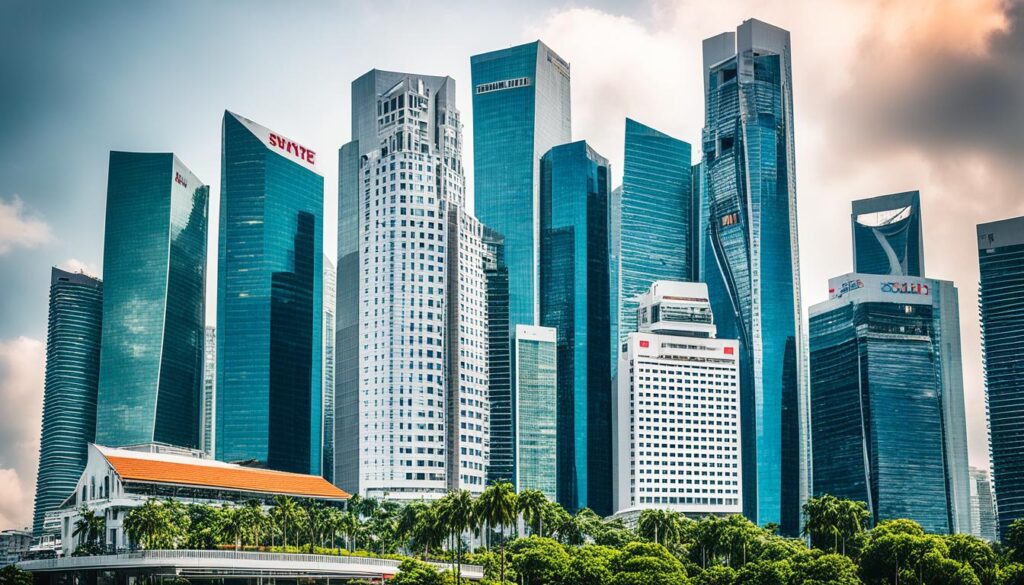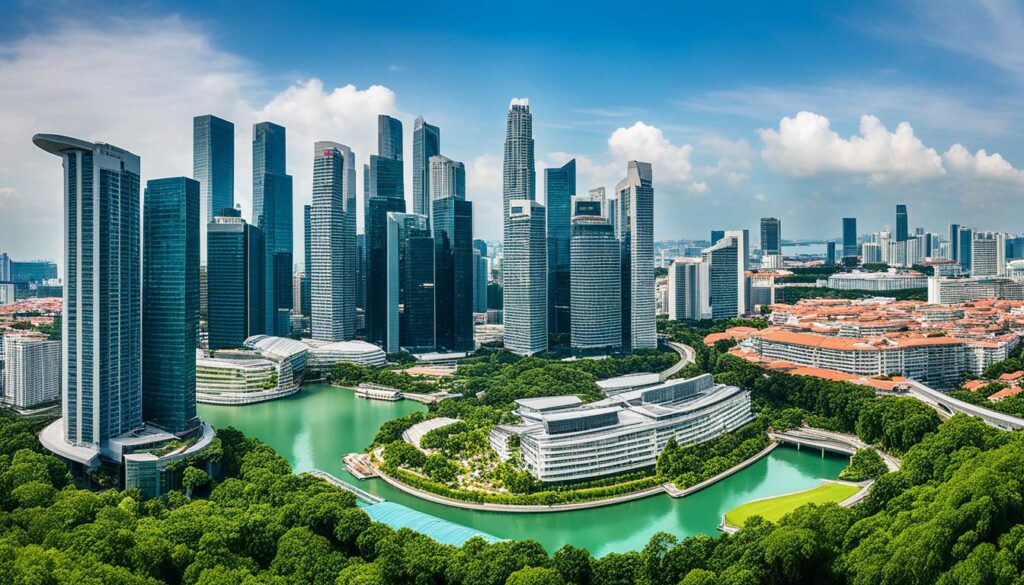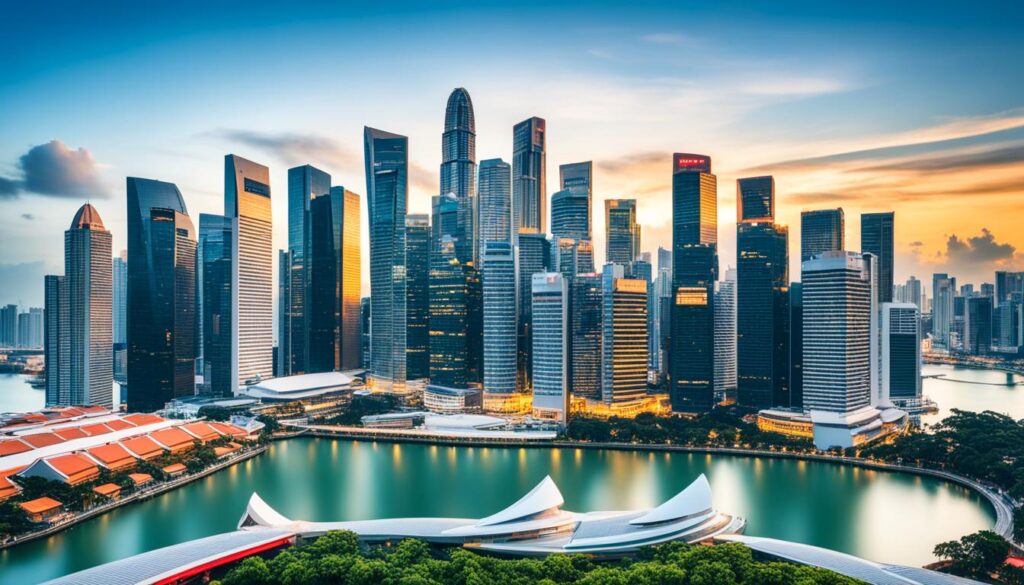Is it a good idea to invest in Singapore’s property market? Over time, both private and public housing prices have steadily increased. This has made the market quite attractive. But, there are hurdles like the Additional Buyers’ Stamp Duties (ABSD) and Total Debt Servicing Ratio (TDSR). These government measures make buying property more expensive.
Still, the chance for your investment to grow in value and to earn money from rent remains strong. To really understand if it’s wise to invest, a detailed Singapore property market analysis is essential.

The real estate market in Singapore is complex, with many factors to consider. This article goes in-depth into the reasons to consider investing in Singapore property and what could go wrong. With these insights, you’ll get a full picture of the real estate investment opportunities in Singapore.
Key Takeaways
- Historical rise in property prices makes it an appealing market.
- Government measures like ABSD and TDSR add to the cost of purchasing.
- Potential for capital appreciation remains strong.
- Rental yields offer a source of passive income.
- Careful market analysis needed to understand investment potential and pitfalls.
Overview of the Singapore Real Estate Market
Singapore’s real estate market has seen rapid growth, with prices going up due to strong demand. Even with high interest rates and rising property prices, buying property in Singapore is attractive. This is especially true in the rental market, where rents are climbing.
The property price trend in Singapore shows the market is steady and a good choice for long-term investment. The government has put in measures like the Additional Buyers’ Stamp Duty (ABSD) to keep the market stable. These steps help make sure investors and homeowners have fair chances.
Let’s take a closer look at essential data illustrating these market trends:
| Year | Property Price Index | Rental Price Index |
|---|---|---|
| 2018 | 150.2 | 96.3 |
| 2019 | 157.6 | 100.5 |
| 2020 | 165.4 | 104.7 |
| 2021 | 175.8 | 110.2 |
| 2022 | 184.1 | 116.9 |
Buying property in Singapore may be a wise decision, seeing the continuous rise in property price trend in Singapore. The market’s strength, even when the world faces uncertainties, proves it’s stable and inviting for both local and international investors.
Pros of Investing in Singapore Property
Buying property in Singapore has many perks for both local and foreign investors. It’s known for good capital growth and dependable rental earnings. Singapore’s real estate is resilient, offering chances for notable profits.

Capital Appreciation
One key advantage of investing in Singapore is capital appreciation. The government boosts property values by improving infrastructure. This allows investors to make a profit by selling later. Property in Singapore is a smart choice for the long haul because of this.
Rental Income
Rental income in Singapore is also a big draw for investors. There’s a strong demand for homes, leading to stable rents. This demand comes from both expats and locals. It means good occupancy rates and rental earnings for owners.
Investment in Real Estate Investment Trust (REIT)
Investing in REITs is another option for those who don’t want to directly manage properties. REITs let you own a share of real estate that earns rent. They’re a smart way to spread out your investments and get tax advantages too.
Leverage
Leverage means you can borrow most of the investment cost. This way, you can increase your profits from both property value rises and rental income. You do this with a smaller initial payment.
Stable and Resilient Market
The property market in Singapore is stable and tough. Thanks to strict government rules, the market is healthy and avoids risky bubbles. For those looking to invest long-term, Singapore’s real estate is a dependable choice.
- Capital Appreciation: Continuous price growth from infrastructural development.
- Rental Income: Steady passive income from a strong rental market.
- REIT Opportunities: Access to diversified properties with tax benefits.
- Leverage: High loan-to-value ratios to maximize returns on investment.
- Market Stability: Government measures ensuring a resilient market.
Cons of Investing in Singapore Property
Singapore’s real estate market looks appealing, but it has its challenges. Potential investors must consider things like high initial costs, market liquidity, strict government rules, and other expenses.
High Capital Outlay and Additional Costs
Investing in Singapore property requires a high capital outlay. Besides the purchase price, there are legal fees, maintenance, and renovation costs. These expenses can overwhelm many investors.
Liquidity Issues
The liquidity issues in real estate are another concern. Unlike stocks or bonds, you can’t sell real estate quickly. Selling property is complex and slow. This makes it hard to get your money out fast.
Market Cooling Measures
The government has applied government market cooling measures. These are meant to keep the market stable but can limit investment gains. Measures like the Additional Buyers’ Stamp Duties (ABSD) can eat into profits.
High Interest Rates
The effect of high-interest rates must be considered too. Borrowing costs in Singapore are steep. This can increase mortgage payments and reduce the return on your investment. Higher interest rates can make rental properties less profitable.
ABSD for Multiple Properties
The ABSD impact matters a lot if you’re buying several properties. High ABSD rates on additional properties raise your costs. This might stop investors from growing their real estate collections.
Key Factors Influencing Singapore Property Market
The factors influencing Singapore property market are complex, affecting buyers and investors deeply. Knowing these factors gives an edge in the city-state’s competitive real estate world.
Government policies like the Additional Buyers’ Stamp Duty (ABSD) and Total Debt Servicing Ratio (TDSR) shape the market significantly. They aim to stabilize the market, manage price increases, and reduce speculative buying. These policies are key drivers of market trends in Singapore.

Interest rates also play a big role. When rates go up, borrowing costs do too. This can reduce demand, especially among new buyers and investors. On the other hand, lower rates can boost the market by making loans cheaper. Watching these rates helps predict where the market will go.
Population growth and urban development trends deeply influence the market. As Singapore grows and develops, demand for homes and business spaces stays strong. Efforts to improve infrastructure and connectivity push property values and rents higher.
Land scarcity makes the Singapore property scene unique. With limited land, prices go up, making real estate very valuable. This situation highlights the need for smart planning and policy intervention to manage land development.
| Factor | Impact on Market |
|---|---|
| Government Policies (ABSD, TDSR) | Stabilizes market, controls price hikes |
| Interest Rate Fluctuations | Influences borrowing costs and buyer demand |
| Population and Urban Development | Drives demand for residential and commercial properties |
| Land Scarcity | Elevates property values, emphasizes the need for strategic planning |
The economy’s health can’t be ignored. A strong economy usually means a strong property market, as more jobs and better wages increase buying and investing power.
Getting to know these factors influencing Singapore property market is crucial for anyone investing or buying there. Keeping up with Singapore property market trends lets people make smarter, more informed choices.
Best Areas to Invest in Singapore Property
Looking at Singapore’s property landscape, it’s key to check out different areas for their unique offerings and investment potential. We’re focusing on three main regions: the Core Central Region (CCR), the Rest of Central Region (RCR), and the Outside Central Region (OCR). Each area presents its own set of perks for investors.
Core Central Region (CCR)
The Core Central Region stands out for its luxury and exclusivity. This area includes posh districts such as Orchard, Marina Bay, and Sentosa. It draws in people with deep pockets who want a high-end living space. The CCR has some of Singapore’s highest property prices. This reflects its elite status and the dense presence of international firms and embassies.
Rest of Central Region (RCR)
The Rest of Central Region is gaining attention from investors thanks to its moderate prices and developmental improvements. Places like Bishan, Toa Payoh, and Queenstown show great promise in the RCR market. They come with future infrastructure plans and more amenities. Here, investors find a sweet spot between affordable prices and the chance for property value to grow. It’s perfect for those looking for a balance.
Outside Central Region (OCR)
The Outside Central Region is noted for being more affordable and suitable for families. Towns such as Punggol, Woodlands, and Jurong East offer prime opportunities for investment, especially appealing to new families and first-time home buyers. The area’s planned comprehensive town designs and better access to downtown make it a bright spot for future value increase.
| Region | Key Attractions | Target Demographic |
|---|---|---|
| Core Central Region (CCR) | Luxury living, proximity to CBD | High-net-worth individuals |
| Rest of Central Region (RCR) | Mid-tier pricing, urban development | Middle-market buyers |
| Outside Central Region (OCR) | Affordability, family-oriented | Young families, first-time buyers |
Is Singapore Property a Good Investment?
When thinking about investing in Singapore property, quite a bit needs to be considered. This includes looking at economic forecasts, checking how much money you have to invest, and thinking about how long you want to invest. It’s important to balance the costs against what you could gain. There are several key things to understand before deciding to invest in Singapore’s property market.
One main reason people invest here is for the rental income. Singapore has a strong demand for places to rent, and some areas offer good returns on investment. On top of that, capital appreciation prospects are another big draw. Especially in areas getting new infrastructures or upgrades. These places usually increase in value, attracting smart investors.
The stability of Singapore’s real estate market is also a big plus. Even when the global economy faces challenges, Singapore’s market tends to stay steady. This makes it a safe option for investors. But, it’s wise to be aware of laws like the Additional Buyers’ Stamp Duties (ABSD) and the Total Debt Servicing Ratio (TDSR). Understanding these can tell you a lot about how your investment might be affected.
It’s crucial for investors to do their homework and think carefully about their investment plan. This way, they can set achievable goals, make the most of opportunities, and avoid risks. With smart planning and strategic choices, investing in Singapore property could be a profitable part of your investment mix.
Conclusion
The Singapore property market shows great promise for long-term investment. It’s vital for investors to weigh both the rewards and risks. The government’s cooling measures, like the Additional Buyers’ Stamp Duties (ABSD) and Total Debt Servicing Ratio (TDSR), affect profits.
The market varies from the upscale Core Central Region to the more affordable Outside Central Region. Assessing rental income potential and property appreciation is crucial for success. This careful evaluation can lead to wise investments in different regions.
In the end, while Singapore’s property market is appealing, careful thought and research are key. With a deep understanding of the market’s complexities, investors can make smart long-term investments in Singapore real estate.
FAQ
Is Singapore property a good investment?
Singapore property offers benefits like value growth and rental income. Yet, it requires a big initial investment and understanding of extra costs and government rules. It’s wise to analyze the market well and plan strategically.
What factors influence the Singapore property market?
Government policies, interest rate changes, population growth, limited land, and economic conditions affect the market. These factors together decide the market’s stability and investment success in Singapore.
What are the best areas to invest in Singapore property?
The Core Central Region attracts the wealthy with luxury homes. The Rest of Central Region is good for mid-priced properties. The Outside Central Region fits younger families looking for affordability.
How has the property price trend in Singapore evolved?
Property prices in Singapore have climbed over time, showing strong demand and a stable market. Even with the government’s cooling measures, the market value has grown in the long run.
What are the pros of investing in Singapore property?
Pros are value growth, renting out for income, investing in REITs, borrowing advantages, and market stability. These make investing in Singapore’s property market appealing.
What are the cons of investing in Singapore property?
The cons include the high cost to start, upkeep costs, the risk of not being able to sell quickly, government rules, high-interest rates, and extra stamp duties on more properties. These could impact profit.
How do government cooling measures impact the Singapore property market?
Cooling measures, such as extra stamp duties and debt service limits, prevent the market from getting too hot. They aim to keep the market steady. Yet, they might limit profit growth for investors.
What is the potential for rental income in Singapore?
Singapore’s rental market is strong, pushing up rents for homes. This means investors could get a good passive income from renting properties.
Are there real estate investment opportunities in Singapore without direct property management?
Yes. REITs let you put money into real estate without managing properties yourself. They can pay dividends and grow in value, attracting certain investors.